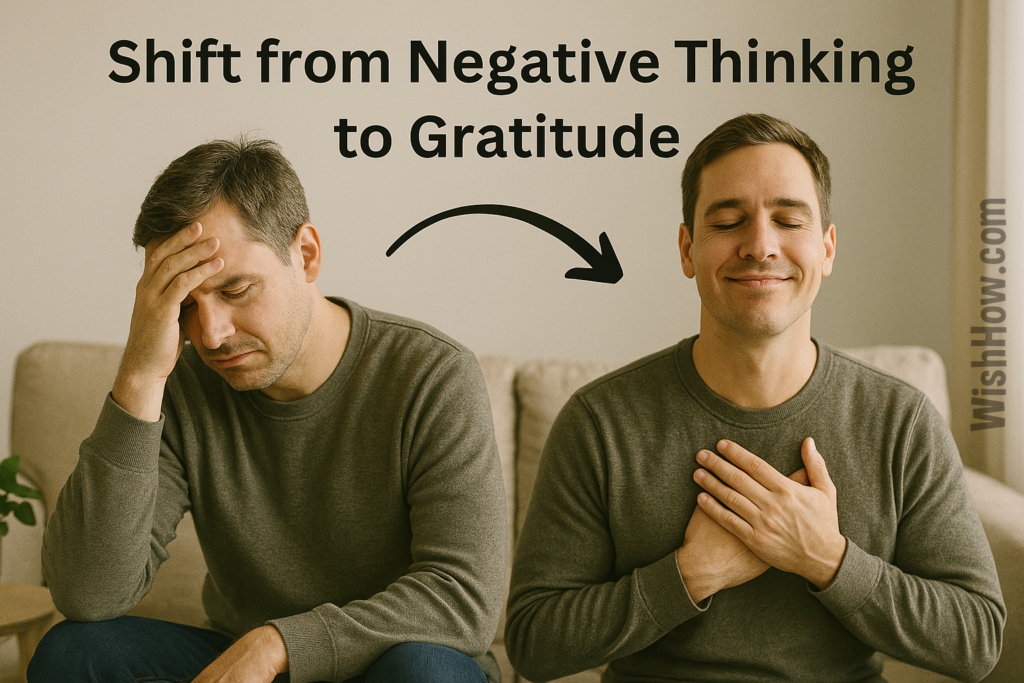This past year has been tough, and I think it’s safe to say we’ve all had our share of dark moments. As an introvert, I tend to have a constant inner monologue running in my head, where I’m always analyzing situations and the words and actions of others.
I really have to work at controlling those negative thoughts to stop them from taking over my day. Some days, it’s just exhausting. But I’m learning as I go.
I’ve struggled with negative thoughts for as long as I can remember. There have been times when I’ve looked at others and felt envious, wishing I could be like them, seemingly unaffected by these thoughts.
It turns out, though, that inner voice is totally natural, whether you’re an introvert or not. Some people have just figured out how to manage it better than others.
Quiet the Negative Inner Voice
When our brain senses danger, it releases stress hormones like adrenaline and cortisol to help us react quickly and stay safe. These hormones were useful back when we were running from saber-toothed tigers, but today, too much of them can make us feel sick.

Don’t get me wrong, sometimes that little negative voice can be helpful—like when it reminds us, “No, I shouldn’t eat that whole pack of biscuits for breakfast.”
It can also keep us motivated and focused on our goals. But, other times, it says things like, “I’ll never be able to do that” or “It’s so obvious they all hate me.”
Also Read: How Can I Change My Mindset to Attract Positivity?
Coping Under Negative Pressure
I remember the first time I had to manage a huge, complicated web project for a client. I was totally out of my comfort zone, and every little obstacle made me think, “I’m really messing this up.”
Those thoughts really hurt my confidence and made me second-guess myself, almost like they were becoming a self-fulfilling prophecy. There were times I felt completely stuck because of them.
On the last day, after everything had gone live, our account director, Neil, called me into his office. My heart was racing, and I was shaking as I sat down.
I was sure he was about to tell me how I’d let everyone down, just like I’d been telling myself for weeks. But instead, he said I’d done an incredible job and handled the pressure really well. He even apologized for not being more supportive.
Are Negative Thoughts Impacting Every Area of Your Life?
Negative thoughts might always be there, or they might come and go. Sometimes, they can ruin your day. But when they get out of hand, you start to realize they can really mess with your life.

These thoughts can hold you back from chasing promotions, jobs, friendships, relationships, or any new opportunities. They can stop you from growing, lead you to make bad choices, and bring out the worst in you.
They can change how you see things and even hurt you physically and mentally, making mood and anxiety disorders worse.
Breathe, Mama, Breathe: 5-Minute Mindfulness for Busy Moms
$10.70 (as of May 23, 2025 18:08 GMT -07:00 - More infoProduct prices and availability are accurate as of the date/time indicated and are subject to change. Any price and availability information displayed on [relevant Amazon Site(s), as applicable] at the time of purchase will apply to the purchase of this product.)I don’t know about you, but the worse I feel, the harder it is to take any positive action. I just fall deeper. My sister, Laura, who’s a psychotherapist, suggested I start writing down every negative thought the moment it comes up. After just a few days, I was shocked. It felt like I had no control over my mind, like I was just poisoning myself.
Getting to Know Your Inner Chimp
When I was talking to my friend Ellen about writing this blog, she mentioned that her negative thoughts have gotten stronger and more frequent since the pandemic started. That makes sense—we’ve all been working from home, with our personal spaces also doubling as workspaces. We’ve felt bored, isolated, lonely, and sluggish, all of which only add to stress, anxiety, and negative thinking.
It was Professor Steve Peters who introduced the “Chimp” concept. According to him, we all have a “Chimp”—a part of our subconscious that’s been with us since birth. The Chimp is the one that made us cry for attention as babies, and now it makes us angry when drivers don’t use their turn signals.
The Chimp stores our emotional memories and tries to protect us from emotional pain. It’s always ready to hit the big red button of anxiety, with a whole collection of negative thoughts to pull from.
Since the Chimp developed before our logical minds, it tends to take over first. It can make us believe things before our logical mind even has a chance to remind us that binge-watching Netflix all afternoon doesn’t mean we’ll never accomplish anything.
Negative Thoughts Can Take Many Forms
The thing about negative thoughts is that they usually don’t reflect reality. Back in the 1960s, U.S. psychiatrist Aaron Beck noticed specific patterns in negative thinking, which he called “Cognitive Distortions” or “Distorted Thinking.”

These patterns are common, completely normal, and not our fault. Beck’s groundbreaking research played a key role in developing his cognitive theory of depression and later Cognitive Behavioral Therapy (CBT).
Since then, researchers have expanded on his ideas and identified at least 10 common distorted thinking patterns. Here are a few from my own life—how many do you recognize?
- Polarized Thinking
In high school, I thought, “If I don’t get straight As, I’ve basically failed.” - Overgeneralization
After breakups, I’d think, “This always happens. I’ll never find anyone,” or when I burned dinner, I’d think, “Why does nothing ever go right?” - Mental Filtering
When I started my own business, I ignored the fact that I’d already achieved a lot—good clients, great friends, a supportive partner. Instead, I focused on why I wasn’t making the exact amount I wanted yet. - Discounting the Positive
Last Tuesday, I was in a slump and thought, “I might be a decent copywriter, but anyone can learn to do that.” - Mindreading
When my partner introduced me to his friends, I spent the whole drive home thinking, “They all hate me, I told that dumb story, and now they think I’m boring.” A couple of hours later, he showed me their group chat where they’d all been singing my praises. - Catastrophizing
When a client hired a full-time writer and I lost their business, I instantly thought, “I’m going to lose all my clients, then I’ll have to move back in with my parents.” - Emotional Reasoning
When my ex-manager Steph suggested I apply for a copywriting position, I thought, “I’m so worthless, there’s no point in trying—I’d never get the job anyway.” Spoiler: I got the job. - “Should” Statements
I get caught up in thinking, “I should be waking up early to do yoga every morning,” and then feel anxious and guilty when I’m too tired to manage it. - Labeling
I once assumed that my ex-colleague Lara was a horrible person because she was a bit short with me when we first met. Spoiler: She was just having a bad day, and we ended up becoming great friends. - Personalization and Blame
When my ex-boss Jo looked annoyed, I immediately thought, “I must have done something wrong. I can’t do anything right.”
Note: If you’re constantly having negative thoughts, it’s important to seek advice from a mental health professional. People dealing with depression and anxiety often experience these kinds of thoughts, which can become overwhelming and painful.
12 Tips to Turn Those Negative Thoughts Into Positive Actions
It wasn’t until I was getting to know my partner, Leo, and he said, “It feels so great to be around a positive person all the time,” that it really hit me. All the effort I had been putting into thinking positively had turned into habits.

Over time, due to something called neuroplasticity, negative thinking patterns become so ingrained in our brains that they turn into physical traits. Our brains are constantly looking for ways to save energy, which is why they try to make things into habits.
The tricky thing about habits is that you can’t just get rid of them—you need to replace them. You have to go back to the start of the cycle and change the response.
How many times have you made a list of all the positive things you’re going to do, only to not act on them? The longer you think about doing something, the less likely you are to actually do it. Negative thoughts will always try to talk you out of it.
Don’t let negative thinking become a lifelong habit. Here are some tips to help train your brain to think more positively. Your actions will also encourage more positive thoughts!
- Start a Journal
Acknowledge negative thoughts instead of pushing them away. You want to resolve them, not bury them where they can come back later. Every day, I write down every positive or negative thought I have, where I was, why it happened, and who I was with. It helps me figure out what triggers negative thinking and how to turn it around next time. - Ask Yourself, “What Would I Say to a Friend?”
We’re usually kinder to others than we are to ourselves. There’s an exercise developed to help kids spot negative thinking patterns, called “BLUE” thoughts—Blaming myself, Looking for bad news, Unhappy guessing, and being Exaggeratedly negative. It works for adults too. Imagine your friend was thinking that way—what advice would you give them? That’s the advice you need to give yourself. - Say “Stop”
It takes time to become aware of your “Chimp” (the part of your brain that drives negative thinking). When you notice it, say “Stop” out loud and tell your Chimp what to do instead. - Change Negativity to Neutrality
Instead of trying to stop negative thoughts completely, try to make them more neutral. Ask yourself, “Is this thought helping or hurting my journey to become my best self?” If it’s hurting, soften the language. For example, change “This is impossible” to “Let’s try a different approach.” Interestingly, when you do this, your brain will start to come up with solutions. - Create an SOS File of Positive Praise
I keep a folder of positive emails and comments from clients and friends for when I feel insecure. It’s a lifesaver on tough days, and I’m always surprised at how quickly I can bounce back after reading them. - Breathe
Mr. Miyagi was right: “When you feel life is out of focus, always return to the basics of life—breathing. No breath, no life.” I use the 4-7-8 breathing technique that Navy Seals use. It helps me relax and think more clearly. You can use it anytime you need to calm down. - Talk to Someone
Whether it’s a therapist, close friend, or colleague who understands what you’re going through, talking to someone supportive can help you see things more clearly and put negative thoughts in perspective. - Follow a Healthy Lifestyle
I do three 10-minute workouts every day. Exercise helps boost mood and reduce stress. Plus, my dog Colin gets me outside, which is great for getting more oxygen to my brain. Exercise also helps with memory, lowers blood pressure, and releases happy chemicals in the brain. - Identify Areas to Change
Which parts of your life tend to trigger negative thinking? Maybe it’s work, a relationship, or your downtime. Start small and focus on changing one area with a more positive approach. - Surround Yourself with Positive People
Being around negative people can make your stress levels higher, make you doubt yourself, and make it harder to think positively. Find supportive people who will give you grounded advice and help you put things into perspective. - Practice Self-Compassion
It’s taken me years, but it’s never too late to start. Tara Cousineau’s book, The Kindness Cure, says that self-criticism just keeps you stuck. Replacing self-judgment with self-compassion helps you accept that you’re flawed and strengthens your mental wellness. - Practice Positive Self-Talk Out Loud
Use your name, not “I.” Talking to yourself in the third person helps you calm down, see things more clearly, and think more rationally, according to University of Michigan psychologist Ethan Kross.
“Stop,” Breathe and Be Kind to Yourself
A few weeks ago, I was so exhausted by the end of Friday that all my weekend plans pretty much went out the window. I did manage to meet a friend for breakfast the next day, but that was about it. By Sunday night, my mind was full of negative thoughts, like, “I’ve wasted the whole weekend.”
Do Hard Things: Why We Get Resilience Wrong and the Surprising Science of Real Toughness
$15.99 (as of May 23, 2025 18:29 GMT -07:00 - More infoProduct prices and availability are accurate as of the date/time indicated and are subject to change. Any price and availability information displayed on [relevant Amazon Site(s), as applicable] at the time of purchase will apply to the purchase of this product.)
So, I told myself, “Stop.” I did some 4-7-8 breathing and imagined what I’d say to my friend Sarah if she were in my shoes.
As my heart rate slowed back down, I started to shift my thinking. Instead of beating myself up, I told myself, “It’s OK, you needed the rest. Maybe you worked too hard this week? Let’s think about how to take better care of yourself next time.” I felt calmer, lighter, and more clear-headed.
Also Read: What are Some Gratitude Exercises to Try?
Positive Impact of Positive Change
It was definitely a wake-up call for me. Now, I’m more mindful about when my workday ends, and I don’t feel so burned out by the weekend.
I’ve stopped skipping lunch on busy days and started eating healthier. As a result, I feel more creative and confident at work, and I actually have the energy to exercise every day and enjoy my free time in a way that recharges me.
Take it from me—and the many scientists and therapists who agree—changing your actions can really change how you feel. Over time, changing your thoughts will actually rewire your brain.
With practice, realistic thinking will become second nature. Your brain will start to see you and your abilities more fairly. Keep up with positive habits, and you’ll notice your confidence grow—along with your achievements and new opportunities.







